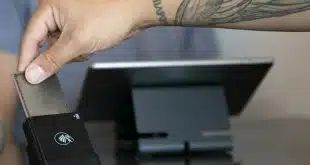The battle to win over online merchants with low transaction fees intensified on Tuesday with the introduction by a Montreal-based startup of a payment platform that offers free processing for orders up to $40. UpClick, which started operations about 18 months ago, has more than a dozen software publishers using its service, which finances processing costs by cross-selling related products to consumers who buy from client merchants. UpClick follows a well-worn path among emerging-payments processors in wooing merchants with free or heavily discounted processing. This has become an especially effective tactic as merchants have ratcheted up their protests in recent years over the interchange fees set by the two major card networks, Visa Inc. and MasterCard Inc. And now some of those alternative-payments players show signs of backpedaling. Google Inc.'s Google Checkout service, for example, recently dropped its offer of free processing for merchants that used its AdWords marketing product. Other online companies, such as TrialPay Inc., have launched services that allow consumers to have products for free if they'll buy merchandise from another vendor, but these services haven't introduced free transaction processing for the merchant (Digital Transactions News, Oct. 10, 2007). The new UpClick platform replaces a version that was more “complex,” making it easier to use, Daniel Assouline, co-founder and chief executive, tells Digital Transactions News. It also ushers in free processing for all sub-$40 orders, which Assouline says account for most of the company's transactions, with the average ticket coming in at $37. Before, UpClick charged 5.9% plus 50 cents per transaction. It now charges a flat 6.9% on any amount in excess of $40. The service is intended specifically for software companies, which Assouline says face unique challenges. “They pay a lot for processing,” he says, pointing to fees ranging from 6.9% to 15% per transaction, often with gateway fees added on. In most cases, the high fees are caused by the need for added accounting to keep track of licensing and other chores. “It's very tedious,” he says. UpClick, whose clients sell products ranging from antivirus programs to audio converters, stands in as the merchant, absorbing PayPal fees and discount fees on credit and debit card transactions. It hosts the checkout page for the merchant, so that customers must leave the merchant's site momentarily in what Assouline calls a “seamless” transition. The checkout page features the merchant's name as well as its own, since the descriptor on the customer's credit card statement will show UpClick as well as the product name. Similarly, UpClick handles all customer-service inquiries and absorbs chargebacks. That latter service can be expensive. “Chargebacks are higher in this [software] field,” Assouline says. “There's just a general trend among people that software should be free.” In return for free processing, merchants agree to let UpClick serve offers for what the company calls “non-competitive” products after the customer has checked out. If the customer buys this so-called cross-sell product, UpClick gives the client merchant 20% of the sale, hands the cross-sell merchant half, and pockets the rest, paying transaction fees out of its share. Since client merchants get free processing regardless of whether their customers bite on the cross-sells, UpClick gambles that enough will convert to pay its costs. Assouline says that hasn't been much of a gamble. “That's something we've validated,” he says. The service also lets merchants join a so-called affiliate network it runs, which gives them the chance to feature their products on the sites of other merchants in the network. UpClick is handling about 3,000 transactions a day, though Assouline says this number is very much in flux as the company grows. “We've had an overwhelmingly positive response to this model,” he says, referring to the new platform.
Check Also
Apple Card Talks Continue and other Digital Transactions News briefs from 1/16/25
Reuters is reporting that Apple Inc. is talking to Barclays to become the iPhone maker’s new partner …





